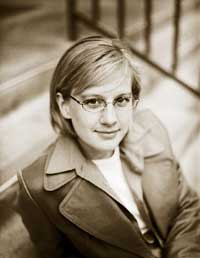By Megan Vandre
 Chelsea D. Jensen thought she was seeing hell on earth during her first night volunteering in a Romanian orphanage. Growing up on a farm in Magrath, Alberta, Canada, didn’t prepare her for the abuse she and friend Annette Orlando saw in a facility for some 80 2-year-olds staffed by only six women. “The kids sat on chairs around a table and weren’t allowed to talk or move. The worker yelled at them and slapped them if they got up. We didn’t speak Romanian; we couldn’t say anything. It was scary,” Jensen recalls.
Chelsea D. Jensen thought she was seeing hell on earth during her first night volunteering in a Romanian orphanage. Growing up on a farm in Magrath, Alberta, Canada, didn’t prepare her for the abuse she and friend Annette Orlando saw in a facility for some 80 2-year-olds staffed by only six women. “The kids sat on chairs around a table and weren’t allowed to talk or move. The worker yelled at them and slapped them if they got up. We didn’t speak Romanian; we couldn’t say anything. It was scary,” Jensen recalls.
“I cried all the way home on the tram. I cried myself to sleep that night. We wanted to just pack our bags and go home,” she says, choking up.
Despite the first night’s fears Jensen stayed six weeks in Iasi (pronounced “Yawsh”), Romania, helping to care for babies. She had traveled there just a few weeks after hearing stories from a missionary couple who had served in Romania–she wanted to help and couldn’t justify putting it off. With no language training, no substantial knowledge of the culture, and no accommodations, Jensen made her way to Iasi with only the names of possible contacts. But she had courage, a big heart, and an intense desire to serve–traits that allowed Jensen to build her limited resources into a service opportunity.
Her passion for service at any cost differentiates Jensen from other members of her often self-focused generation. This 26-year-old returned missionary isn’t afraid to change the world–something she says everyone can do. But Jensen is as down to earth and realistic about the possibilities for change as a basketball coach with a struggling team. Hard work doesn’t scare her, and she wants everyone to catch her vision, to trust themselves to make a difference.
“If I could change the world I would want every person to really have a sense of who they are,” Jensen says. “Everyone would know the contribution they could make, and they would make it.”
Her perspective was shaped in part by her experience in Romania. Jensen proposed the trip as a service project in sociology professor John F. Seggar’s “Effective Social Relations” class. The class helped earn trip funds and located some Romanian contacts. The names were little to go on, but combined with Jensen’s initiative, they were enough to produce ongoing access to the orphanages. Upon returning Jensen inspired what has become a work study program through BYU’s David M. Kennedy Center.
Last summer when she described her orphanage experience to Seggar’s class, two students immediately decided they wanted to continue the work. “She was so honest about it, so sincere and grateful for the experience,” said Melissa Eggleston. “I felt like, ‘This is the most incredible thing I’ve ever heard.'”
Jensen’s leadership continues to help the program expand. Fourteen BYU students will work in the orphanages in 1999, administering a child development test to assess needs, and Jensen has helped train them all. She makes them aware of cultural assumptions through week-long assignments, like not driving (to help them realize how much Americans depend on cars) or like eating only three foods (to help them appreciate the U.S. food supply). “Isn’t that unhealthy?” one student asked. “Yep,” Jensen said. “That’s the point.” And she doesn’t give the students any leeway.
And Jensen is just as exacting with herself. Besides working part-time as student facilitator for the program, she is collections manager at Utah Valley Pediatrics and a student graduating in August. Nine of her 12 winter semester credits were internship hours for the Romania program’s development. In the evenings Jensen reads about Romania and tries to make time for friends and family–her “most satisfying happiness” along with her testimony of Jesus Christ. Saturday is an exception to her hectic schedule; she spends it at garage sales.
Jensen says her strong will and even bullheadedness help her succeed, although these traits can work against her. “I think sometimes our strengths and weaknesses are the same things. My strong will makes me successful because I will work twice as hard as the next guy. But sometimes I’m so bullheaded that I won’t stop and see.”
That strength of will may make others think she is fearless, but Jensen says, “Everyone is afraid. The difference is that some people are afraid and let it immobilize them, and some people let it push them forward and drive them.”
“You can do anything,” she says. “Anyone can make a difference. Just don’t be afraid. Or be afraid, but just don’t let it stop you.”






